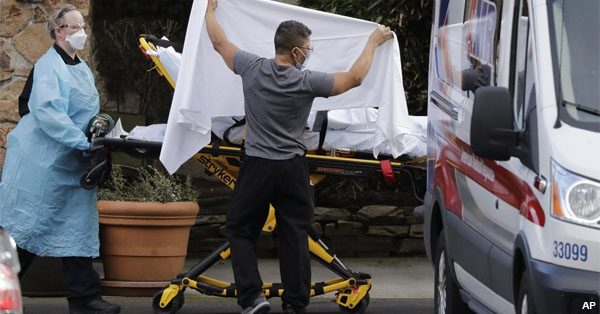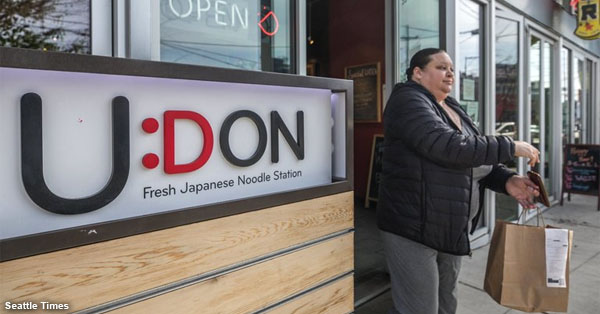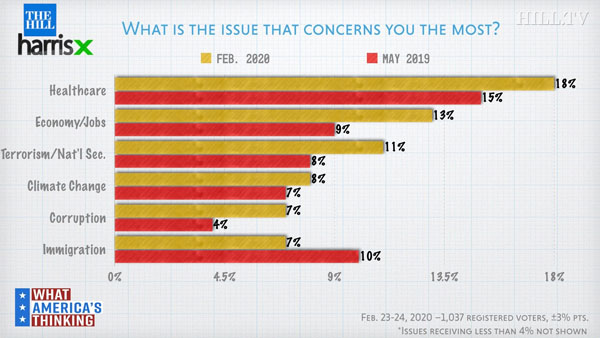NEWS ROUNDUP
Get the facts on COVID-19 ● Supremes to reconsider ACA repeal ● No grads, no grades
Monday, March 2, 2020
COVID-19
► From Public Health—Seattle & King County — King County has confirmed cases of novel coronavirus and more cases have been identified in the U.S. The vast majority of the illnesses around the world are mild, with fever and cough. A much smaller percentage of cases are severe and involve pneumonia, particularly in elderly people and people with underlying medical conditions. Two people in King County have died. It’s important that everyone take steps to reduce the spread of novel coronavirus. This is a quickly evolving situation.
Go to www.kingcounty.gov/covid for information about how organizations and individuals should prepare now in order to reduce the number of illnesses and negative effects that could occur in our community, for novel coronavirus facts sheets in multiple languages, and to sign up for email alerts to learn when significant information has been posted to that site.
► In today’s Seattle Times — A second person in U.S. — and King County — dies of novel coronavirus; more cases likely — A second death from COVID-19 struck King County and the United States on Sunday, placing the Northwest at the center of a mushrooming public-health crisis. The number of confirmed cases in the county jumped to 10, while health authorities warned it would likely rise, and new research indicated the novel coronavirus may have been spreading undetected in the region for weeks.
► In today’s Seattle Times — As schools announce closures for coronavirus, Seattle-area parents wonder what’s next — Because state law gives local health agencies the power to identify diseases and shut down schools, district leaders are often taking orders directly from county officials, and relaying secondhand information to families.

► In the NY Times — Avoiding coronavirus may be a luxury some workers can’t afford — Stay home from work if you get sick. See a doctor. Use a separate bathroom from the people you live with. Prepare for schools to close, and to work from home. These are measures the CDC has recommended to slow a coronavirus outbreak in the United States. Yet these are much easier to do for certain people — in particular, high-earning professionals. Service industry workers, like those in restaurants, retail, child care and the gig economy, are much less likely to have paid sick days, the ability to work remotely or employer-provided health insurance.
► In the Washington Post — Gig workers face the spread of the new coronavirus with no safety net — Some workers here who provide on-demand rides and delivery services, but are independent contractors without many protections, are bracing for the spread of the novel coronavirus. Edan Alva, who drives full-time for Lyft in the Bay Area, said the company has not communicated with drivers yet about the novel coronavirus, despite the risk of infection.

► From Politico — Trump aides overtake health officials’ narrative — again — Mick Mulvaney, the acting White House chief of staff, accused the media on Friday of stoking fear over coronavirus as a plot to take down Trump, warned of potential school shutdowns and appeared to chastise investors for monitoring news coverage of the outbreak.
► In today’s Washington Post — Media outlets help Trump push dangerous, false spin on coronavirus — Journalists need a new approach for tackling the president’s claims if they don’t want to be complicit in pushing propaganda.
LOCAL
► In today’s Seattle Times — Should Seattle mandate $16 per hour for workers on delivery apps? Campaign coming to City Hall — Mariah Mitchell plans to take part in a campaign by the advocacy organization Working Washington that will call for legislation that would require delivery-app workers to be paid Seattle’s minimum wage, plus expenses. People who work for the apps are classified as independent contractors, rather than employees, so they aren’t covered by Seattle’s $16.39-an-hour minimum wage for large companies.
► In the Kitsap Sun — Pregnant, nursing mothers file cases against shipyard after being sent home without pay — At least four women who filed cases against the Puget Sound Naval Shipyard, alleging their rights were violated under the federal pregnancy discrimination act.
BOEING
► From Bloomberg — FAA tells Boeing more training for 737 Max pilots may be needed — U.S. regulators have told Boeing that pilots may require additional training to properly respond to emergencies on the 737 MAX after airline crews failed to perform proper procedures in simulator tests.
► In the (Everett) Herald — A Boeing supplier struggles to weather the 737 MAX crisis — Snohomish County is home to about 200 aerospace suppliers, including a handful operated by women. These days many suppliers face hardships, including workforce cuts and reduced hours — the result of Boeing’s decision earlier this year to temporarily halt production of the Renton-built 737 MAX.
THAT WASHINGTON
► From The Hill — Supreme Court to hear ObamaCare appeal — The Supreme Court on Monday announced it will take up a case seeking to overturn the Affordable Care Act, returning the health care law’s fate to the high court. The major announcement means that the case will loom over the November elections and could make the ACA an even bigger issue in the presidential race. The case, brought by a group of Republican-led states and is supported by the Trump administration, threatens to blow a major hole in the health care system and overturn coverage for roughly 20 million people.
► From the Hill — Poll: Health care named top issue for voters, rises from last year — Health care remains the top concern for voters, even more so than a year ago, according to a new Hill/HarrisX poll. The Feb. 23-24 survey found 18 percent of voters named health care as their top concern, compared to 15 percent who said the same in a May poll.
► From Reuters — NLRB says company could tighten attendance rules without bargaining with union — The NLRB has ruled that an aluminum products manufacturer did not break the law by changing its attendance policy without bargaining with its employees’ union.
NATIONAL
► From The Guardian — UC Santa Cruz fires 54 graduate students participating in months-long strike — The University of California, Santa Cruz, issued termination letters on Friday to 54 graduate students who have been waging a months-long strike for a cost-of-living-adjustment amid soaring rents. The firings came as graduate students at UC Davis and UC Santa Barbara, began their own cost-of-living strikes in solidarity. One of their demands is that all UC Santa Cruz graduate workers who participated in strike activities be restored to full employment status.
► From the AP — South Dakota heads toward banning university faculty union — appears ready to get rid of the faculty union at state universities, even while union members say the move threatens their academic freedom and the viability of the university system.
► From The Guardian — Children as young as eight picked coffee beans on farms supplying Starbucks — Starbucks has been caught up in a child labour row after an investigation revealed that children under 13 were working on farms in Guatemala that supply the chain with its beans.
TODAY’S MUST-READ
 ► From BBC News — The boss who put everyone on $70,000 — In 2015, Dan Price, the boss of a card payments company in Seattle introduced a $70,000 minimum salary for all of his 120 staff — and personally took a pay cut of $1 million. Five years later he’s still on the minimum salary, and says the gamble has paid off.
► From BBC News — The boss who put everyone on $70,000 — In 2015, Dan Price, the boss of a card payments company in Seattle introduced a $70,000 minimum salary for all of his 120 staff — and personally took a pay cut of $1 million. Five years later he’s still on the minimum salary, and says the gamble has paid off.
The headcount at his company, Gravity Payments, has doubled and the value of payments that the company processes has gone from $3.8 billion a year to $10.2 billion. More than 10 percent of the company have been able to buy their own home, in one of the U.S.’s most expensive cities for renters. Before the figure was less than 1 percent. The amount of money that employees are voluntarily putting into their own pension funds has more than doubled and 70 percent of employees say they’ve paid off debt. But there are other metrics that Price is more proud of.
“Before the $70,000 minimum wage, we were having between zero and two babies born per year amongst the team,” he says. “And since the announcement — and it’s been only about four-and-a-half years — we’ve had more than 40 babies.”
The Stand posts links to Washington state and national news of interest every weekday morning by 10 a.m.










